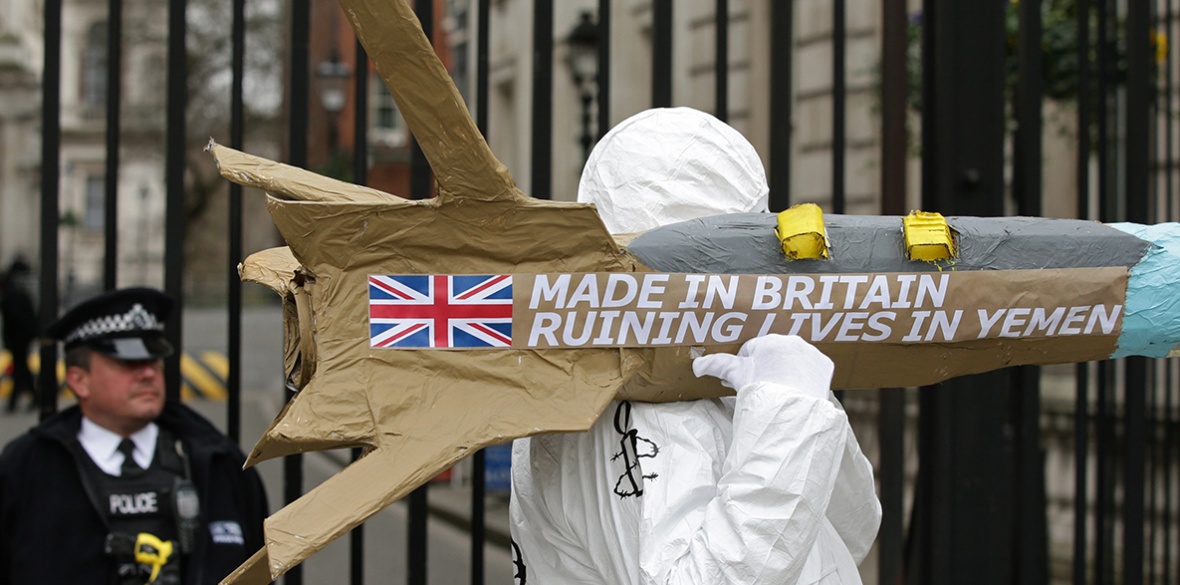This is the last article you can read this month
You can read more article this month
You can read more articles this month
Sorry your limit is up for this month
Reset on:
Please help support the Morning Star by subscribing here
SAUDI Arabian forces along with those of the United Arab Emirates (UAE) invaded Yemen in March 2015 to reverse the popular uprising led by Houthi rebels. The Saudis main war aim has been to reinstate the puppet leader, the unelected president Abed Rabbo Mansour Hadi, to power. Hadi fled to Riyadh after being toppled by the Houthis (from north-western Yemen) in September 2014. The Saudis regard the Houthis as being too closely aligned to its major regional rival, Iran.
All of the countries comprising the Gulf Co-operation Council (GCC) except Oman are supporting the war. Other Arab countries, such as Morocco, Egypt and Jordan, have also offered help.
Britain, the US and nations across the European Union are complicit in the ongoing war in Yemen. The US and Britain are providing intelligence and logistics, while the use of British-made fighter jets and British-made bombs and missiles has had a devastating impact, including the loss of many civilian lives. Britain’s government has supported the coalition with billions of pounds of arms sales.
Anti-arms-trade groups have also highlighted the role played by a number of other European countries in sustaining the war in Yemen — however, over half of the combat aircraft used for bombing raids by the Saudis are supplied by Britain.
There can be little doubt that these weapons have been used in the attacks upon civilian targets and researchers on the ground have retrieved material which backs this up from education establishments, warehouses and hospitals. As well as aircraft, Britain has supplied precision-guided missiles and cluster bombs resulting not only in devastating loss of life but life-altering injuries.
With the medical infrastructure in a state of collapse, due to a combination of the bombings and the blockade of essential supplies, the UN has described Yemen as the world’s most urgent humanitarian crisis. UN secretary-general Antonio Guterres has described Yemen as being in “imminent danger of the worst famine the world has seen for decades.”
Taking into account deaths directly as a result of the war and those from indirect causes, such as lack of food, health services and infrastructure, the UN calculates that the conflict has resulted in an estimated 233,000 deaths and has launched a $3.4 billion (£2.5bn) appeal to address the humanitarian catastrophe.
Unicef executive director Henrietta Fore has also appealed to the international community to step up and provide urgently needed funds for aid programmes. Fore repeated the call on all parties to the conflict to ensure children are protected and that unhindered access to communities in need is ensured. It is estimated that an astonishing 80 per cent of the country’s population — over 24 million people — require some form of humanitarian assistance and protection, including more than 12 million children.
The British government has attempted to defend its position by pointing to the £1 billion in aid that has been provided to Yemen since the conflict began in March 2015. However, as the Campaign Against the Arms Trade (CAAT) point out, “The most recent government statistics show that Britain has licensed at least £6.5bn worth of arms to the Saudi-led coalition since the start of its ongoing bombing campaign in Yemen. The figure covers the period from March 26 2015, when the bombing began, until March 26 2020.”
In June 2019, the Court of Appeal ruled that the government acted unlawfully when it licensed the sale of British-made arms to Saudi-led forces for use in Yemen without making an assessment as to whether or not past incidents amounted to breaches of International Humanitarian Law. This followed a case brought by CAAT. The government was ordered not to approve any new licences and to retake the decisions on extant licences in a lawful manner.
In July 2020 the government announced that it was resuming arms sales. Secretary of State for International Trade Liz Truss, in a written statement to Parliament, said that the government had completed the review ordered by the Court of Appeal, and had determined that any violations of international law were “isolated incidents.” In October 2020 CAAT launched a new Judicial Review application into the legality of the government’s decision to renew arms sales.
It is vital that the CAAT legal challenge is supported in order to challenge the position of the British government. Trade unionists and peace activists in Britain are being encouraged to lobby their MPs in order to highlight the extent of the humanitarian crisis in Yemen and put pressure upon the government to stop the sale of arms to Saudi Arabia and its allies. The international aid effort coordinated through the UN must also be supported, along with the call of the secretary-general for a ceasefire, in order to focus upon the Covid-19 pandemic.
Steve Bishop sits on the executive council of the Committee for the Defence of the Iranian People’s Rights, a long-standing affiliate of Liberation.
Liberation, the anti-imperialist organisation in Britain, has organised a Zoom meeting on January 21 as we approach the International Campaign for an end to Yemen War on January 25.
Speakers include Jeremy Corbyn MP, Andrew Murray of the Stop the War Coalition, Sevim Dagdelen, member of German Bundestag, Kirsten Bayes for CAAT and Iraklis Tsavdaridis, Executive Secretary of the World Peace Council. Baroness Christine Blower, former NUT general secretary will chair.
To register go to www.mstar.link/Yemen21.









